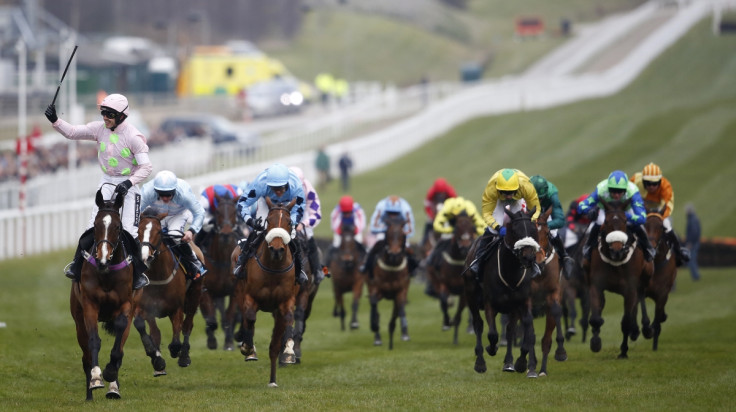Horse racing bookmakers endure worst-ever Cheltenham as favourites storm home

The late US comedian Danny Thomas once famously described a race track as "a place where windows clean people". While Thomas' words still ring true, he would not have been disappointed to see the thorough cleaning the windows at Cheltenham underwent over the last four days, as bookmakers endured the worst festival in history.
On Gold Cup Day, the final day of the festival (Friday 18 March), Betfred avoided a £1m payout on Cue Card, as the horse fell in the final stages of the race that represents the climax of the jump racing season. Jockey Club Racecourses launched the £1m Chasing Triple Crown in 2015 and insured against the bet by backing a horse to win it with Betfred.
Cue Card had won the first two legs of the triple crown but unseated just three fences from the end of the Gold Cup race. However, while Betfred avoided a £1m pay-out on Cue Card, the firm and fellow bookmakers saw favourite Don Cossack came home in front, bringing the bookies' loss to a record high £60m.
Over £100m are estimated to have been wagered over the four-day festival and bookmakers were under the cosh from the very start, as three of the four favourites from Willie Mullins' stable stormed home in emphatic fashion on day one.
In 2015, bookmakers were on the verge of losing £50m in a single day – which would have been their worst performance in history – only to be rescued when Mullins' Annie Power fell at the last hurdle when a couple of lengths in front.
On Tuesday (15 March), Annie Power was a 5-2 winner and the Irish trainer also enjoyed wins for Douvan (1-4) and Vroum Vroum Mag (4-6), although his other horse, Min, finished second. The result meant bookmakers narrowly avoided a Mullins whitewash, but they were left nursing deep wounds nevertheless.
"It was a relief [avoiding four winners for Mullins] but a worse result than last year as William Hill gave away a record 13,000 free bets to punters as consolation for Min's second place," said William Hill's communication director Ciaran O'Brien. "Punters merely rolled up on the other three Mullins hotpots and we were £2m down after day one."
The biggest single stake of the first day was an on-course bet of £220,000 on Douvan, which returned £300,000, while many punters Mullins' three winners in multiple bets, meaning the danger of a huge payout for bookmakers was averted but only to an extent.
"The betting industry still paid out around £10m and it would have gone up to £40m if Min won," said Ladbroke's Alex Donohue. "Punters quickly steamed back into the treble which was 10/1, and the winner Altior was the second favourite and also popular. Annie Power got us out of jail last year but she firmly put us back in the slammer this time."
Over the last four years, the percentage of winning favourites at Cheltenham has dwindled during the festival, falling from 40% on day one to 19% on day four. True to form, day two and day four saw a couple of minor surprises, with two 5-1 winners, a 13-2 and a 11-1 winners, but not even that managed to rescue the bookmakers.
"The amazing thing on Wednesday [16 March] was we got every favourite beaten and still lost money. I cannot remember that ever happening ever before," added O'Brien.
Britain's betting industry generates approximately £3bn and Cheltenham retains its status as one of the biggest week for the sector and attracts a lot of occasional punters, while customers who normally bet on different sports are also tempted to place a bet. "The trend we are seeing growing each year is the interest from occasional racing fans and people who regularly bet on football," Donohue added.
With bookmakers available online and via smartphone apps, it is no surprise to see the industry booming around events such as Cheltenham and figures from the 2015 event suggest that bookmakers saw a phenomenal 47% rise in transactions during the four day festival.
According to payment services provider Worldplay, betting transaction at online bookmakers are expected to increase by 50% over the four-day festival with a 57% uplift in the number of bets placed on Gold Cup Day.
© Copyright IBTimes 2025. All rights reserved.






















